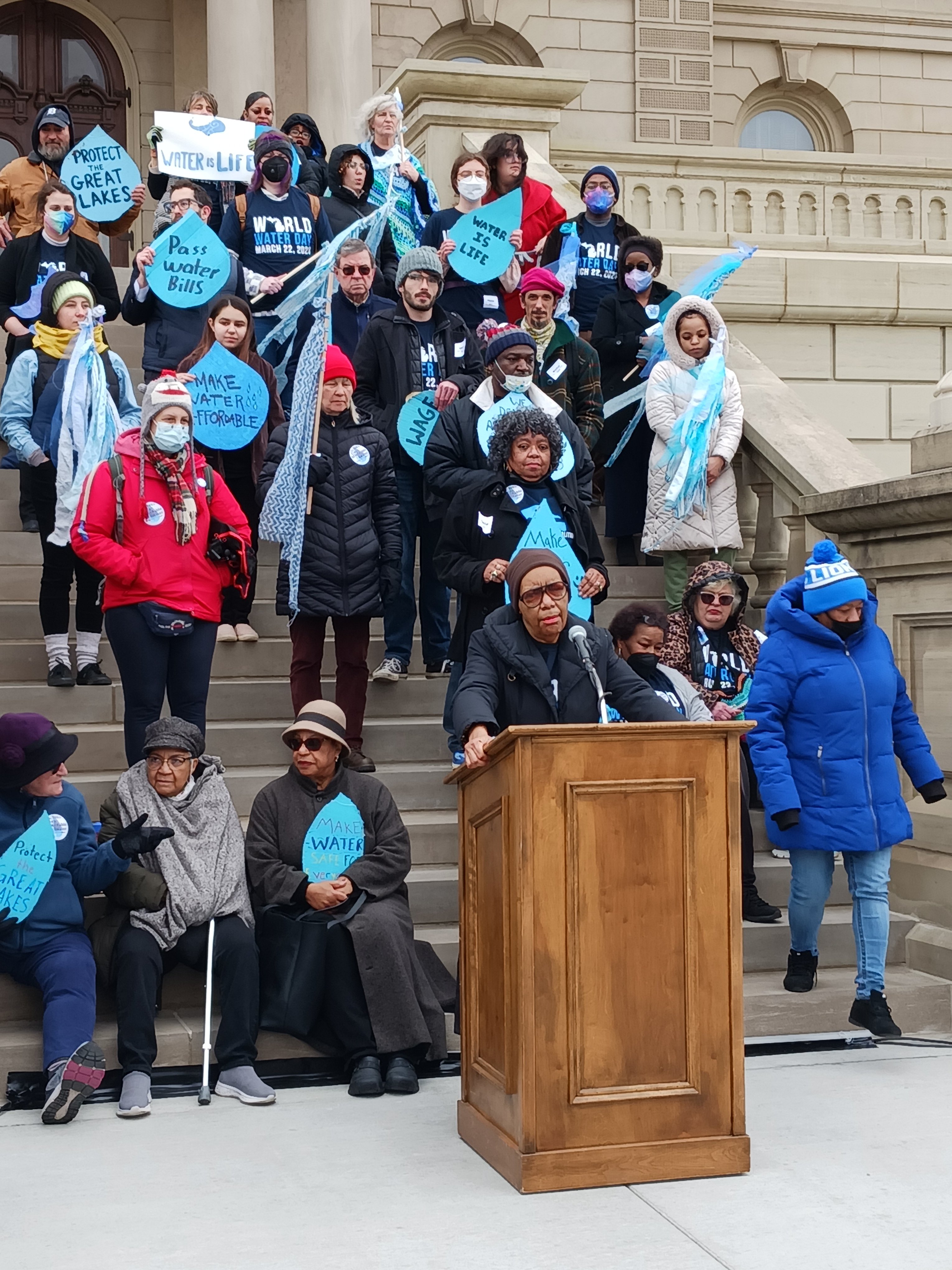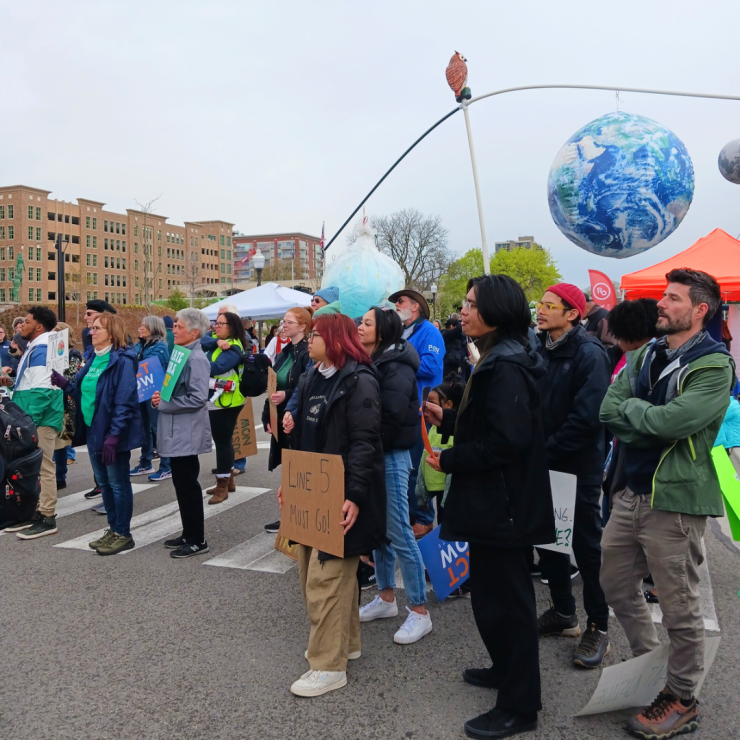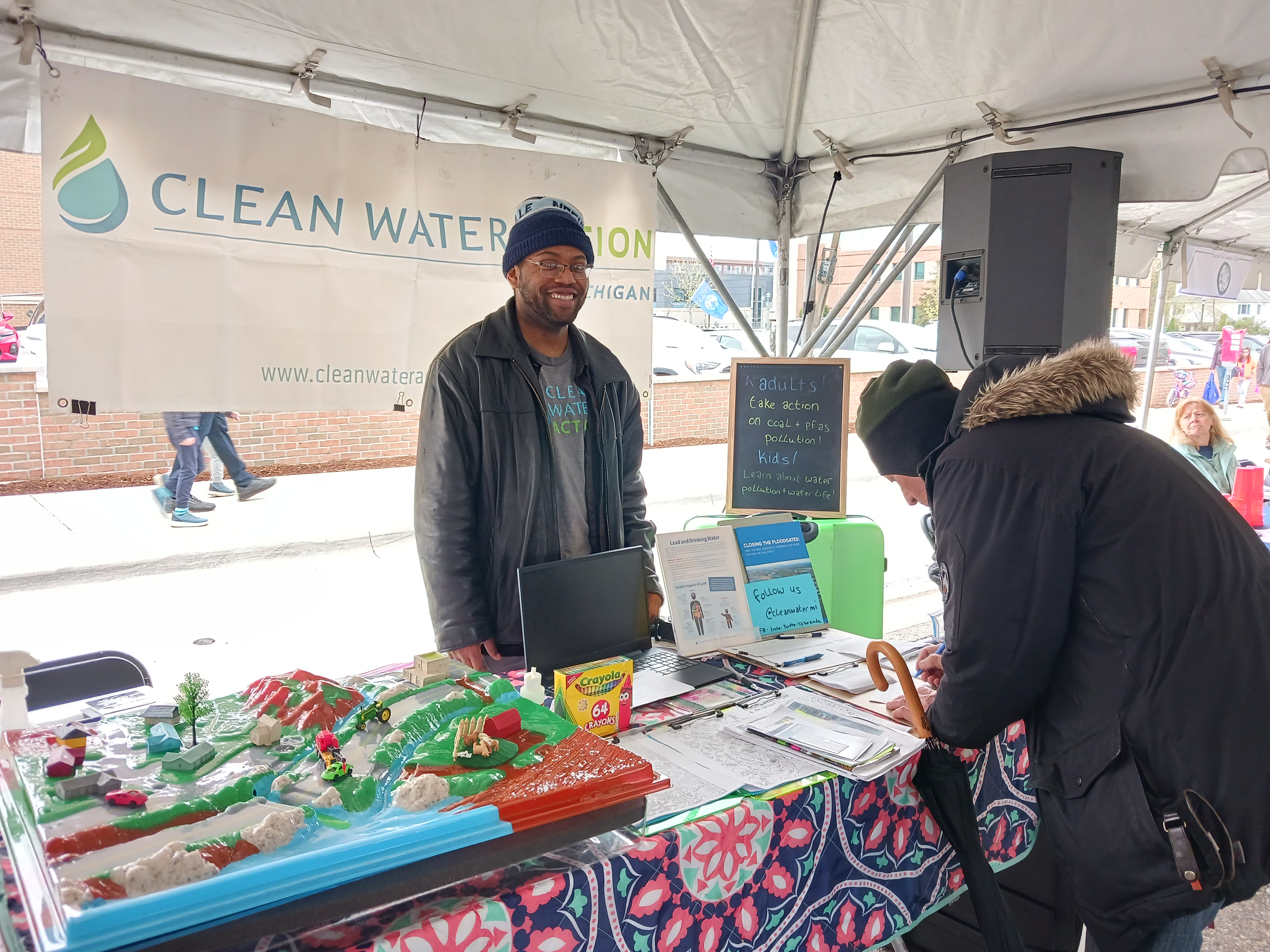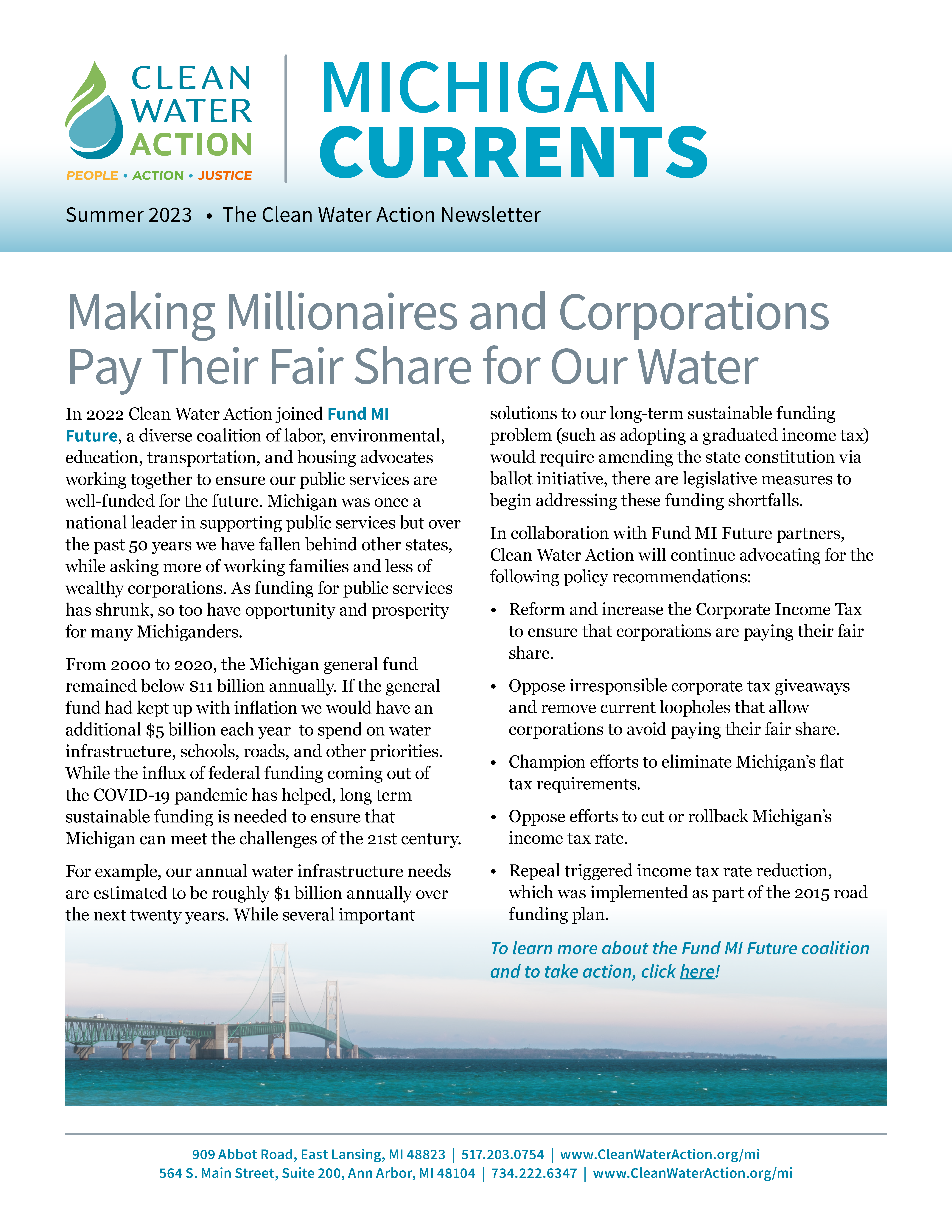In This Issue:
- Making Millionaires and Corporations Pay Their Fair Share, for Our Water
- What will the Michigan Legislature do for our Water?
- Fighting Climate Change and Holding DTE Energy Accountable
- Clean Water Action as Allies in the Fight for Environmental Justice
- When You Make A Mess, You Clean It Up!
- Download a PDF of this issue
Making Millionaires and Corporations Pay Their Fair Share, for Our Water
In 2022 Clean Water Action joined Fund MI Future, a diverse coalition of labor, environmental, education, transportation, and housing advocates working together to ensure our public services are well-funded for the future. Michigan was once a national leader in supporting public services but over the past 50 years we have fallen behind other states, while asking more of working families and less of wealthy corporations. As funding for public services has shrunk, so too have opportunity and prosperity for many Michiganders.
From 2000 to 2020, the Michigan general fund remained below $11 billion annually. If the general fund had kept up with inflation we would have an additional $5 billion each year annually to spend on water infrastructure, schools, roads, and other priorities. While the influx of federal funding coming out of the COVID- 19 pandemic has helped, long term sustainable funding is needed to ensure that Michigan can meet the challenges of the 21st century. For example: our annual water infrastructure needs are estimated to be roughly $1 billion annually over the next twenty years. While several important solutions to our long-term sustainable funding problem (such as adopting a graduated income tax) would require amending the state constitution via ballot initiative, there are legislative measures to begin addressing these funding shortfalls.
In collaboration with Fund MI Future partners, Clean Water Action will continue advocating for the following policy recommendations:
- Reform and increase the Corporate Income Tax to ensure that corporations are paying their fair share.
- Oppose irresponsible corporate tax giveaways and remove current loopholes that allow corporations to avoid paying their fair share.
- Champion efforts to eliminate Michigan’s flat tax requirements.
- Oppose efforts to cut or rollback Michigan’s income tax rate.
- Repeal triggered income tax rate reduction, which was implemented as part of the 2015 road funding plan.
▶ To learn more about the Fund MI Future coalition and to take action, click here.
What will the Michigan Legislature do for our Water?
We are now six months into the legislative session and the first Democratic trifecta in 40 years has shown that they can move bills quickly through the legislative process. Legislative leaders have made good on campaign promises to repeal right to work, reinstate prevailing wage, expand the Elliott Larsen Civil Rights Act, protect reproductive healthcare, and have begun working on bills to strengthen the electoral process.
The Michigan State Senate has passed bills to require water filtration at schools and daycares to protect children from lead poisoning. The Senate has also voted to repeal “No Stricter than Federal,” which was a Governor Snyder-era law that required Michigan to have no environmental protections that are stronger than federal minimums. In the House, a strong bill package to create a statewide septic code has been introduced and we are working to ensure that it finally passes this year, as Michigan is the only US state that currently lacks a statewide septic code.
We are still waiting for action on several of the transformative environmental policies that helped bring Democrats into the majority during the 2022 election. Here are some of the top policies that we are eager to see this legislature address:
Polluter pay: Recent polling shows that 93% of Michigan residents want polluting corporations to pay to clean up the messes that they make instead of relying on taxpayers to foot the bill. On top of that, most lawmakers who are currently serving in the majority ran campaigns on holding corporate polluters accountable, so this should be an easy win. However, those same polluting corporations spend extreme amounts of dark money on elections and lobbying. Despite strong support, it seems the influence of dark money on our legislative process could hold up strong polluter accountability bills from passing this year. Act Now.
Water Affordability: Senator Stephanie Chang has been at the forefront of the fight for water affordability throughout her entire legislative career. This term, Clean Water Action has been a part of a large stakeholder group that she has been leading to ensure that we get water affordability legislation right. The key components we need to see in the bill package are a ban on water shutoffs for non-payment for families making less than 200% of the federal poverty line, and a guarantee that low income residents don’t have to pay more than 2% of their income towards water. Act Now.
Climate and Energy: There is a long list of necessary changes when it comes to how we prepare for the climate crisis and ensure that all residents have access to affordable, clean energy. The House and Senate has introduced bills to increase renewable energy and make home solar easier and more accessible, but with energy policy the devil is always in the details. We will continue advocating for them to be as strong as possible. After massive power outages in DTE and Consumers Energy service territories this February, the Energy Committees in both chambers held hearings on power outages. However, these energy monopolies have managed to rake in massive profits while not investing in their infrastructure and merely holding hearings does nothing to hold them accountable. We will continue advocating for bills to be introduced to actually hold monopoly utilities accountable.

⬆️ Clean Water Action members and other grassroots activists hold a press conference at the Michigan Capitol Building on World Water Day advocating for water affordability legislation.
Fighting Climate Change and Holding DTE Energy Accountable
As summer begins, Michiganders are already dealing with the harsh reality of a changing climate, facing record temperatures in May, June, and July. As the frequency and severity of weather events increases, the stability of our electric grid becomes even more critical. Despite its absolute importance, electric utilities, like DTE Energy, continue to neglect the power infrastructure we all rely on. Many in DTE’s service area are growing familiar with the company’s poor reliability. In February, DTE customers experienced frequent and prolonged periods of outages. As the hottest days of the year are fast approaching, conversations about grid reliability continue. Lawmakers and activists across the state are sharing concerns and demanding accountability. Some are calling for publicly-owned utilities, doing away with the investor-owned model altogether.
Ann Arbor for Public Power (A2P2), a grassroots coalition of which Clean Water Action is a part, is leading the energy democracy conversation, calling for the City of Ann Arbor to municipalize its electric utility. With strong community support and pressure on the city council and mayor's office, the City agreed to move forward with a feasibility study to determine how that transition could happen. The study is being completed by 5 Lakes Energy and is expected to be released in the coming weeks.
Clean Water Action supports the transition away from the unaccountable, profit-driven utility model. Utilities provide public services, necessary for all of us. Large investor owned utilities perpetuate our reliance on fossil fuels, lack accountability to their customers, and dirty our political system with dark money contributions. They are dragging their feet on clean energy by refusing to align their transition planning with the international consensus of fossil-free by 2030.
In order to respond to climate change effectively, electric utilities must be responsive to the communities they serve, and held accountable when they fail to provide reliable service. Utilities need to invest in significant renewable energy generation, and stop slowing our response to climate change for the sake of their stranded oil and gas assets. Michiganders must demand that lawmakers take action to protect ratepayers and residents over the interests of DTE’s shareholders.

⬆️ Clean Water Action joined hundreds of metro Detroiters in Royal Oak for the 2nd Annual Earth Day Climate March, Rally, and Fair.

⬆️ Southeast Michigan organizer Erik McCleary talked to attendees about how they can act on climate at the local, state, and national level.
Clean Water Action as Allies in the Fight for Environmental Justice
The impacts of environmental contamination and climate change are felt strongest and most immediately by low income communities and communities of color. To address this long standing injustice, we must pursue policies that center environmental justice and provide immediate relief to impacted communities and residents. Communities that are the most impacted by industrial pollution, failing infrastructure, and climate change are often also at a disadvantage when it comes to obtaining funding to address these problems. Most lower-income municipalities lack staff that are capable of navigating complex state and federal grant processes. It is often more difficult for these communities to access bond funding, and thus rely on utility rate increases to fund infrastructure investments which leads to less affordable water and power, and increased water and utility shut-offs.
Investing in the environmental health, well-being, and economic recovery of communities across Michigan is the right thing to do. That’s why Clean Water Action stands with Environmental Justice leaders in advocating for common-sense, equitable solutions that put our communities above corporate profits. No one in Michigan should have their drinking water turned off. Permitting decisions need to consider the cumulative impact on air, water and adjacent communities, instead of looking at impacts of each permit individually. Companies who are fined for environmental violations should foot the bill for the clean-up, and those fines should be spent in the directly impacted communities. Michigan needs to be a leader in protecting our most vulnerable communities by directing at least 40% of state climate and clean energy investments into those communities. These are just some of the solutions that Clean Water Action will continue fighting for, in solidarity with our Environmental Justice allies and the communities within which they serve.
When You Make A Mess, You Clean It Up!
Michiganders agree: when you make a mess, you clean it up! It’s time to hold polluting corporations accountable for their contamination. Urge your Legislators to pass strong “Polluter-Pay” laws to protect our Great Lakes and communities. ▶ Learn more and take action here.
